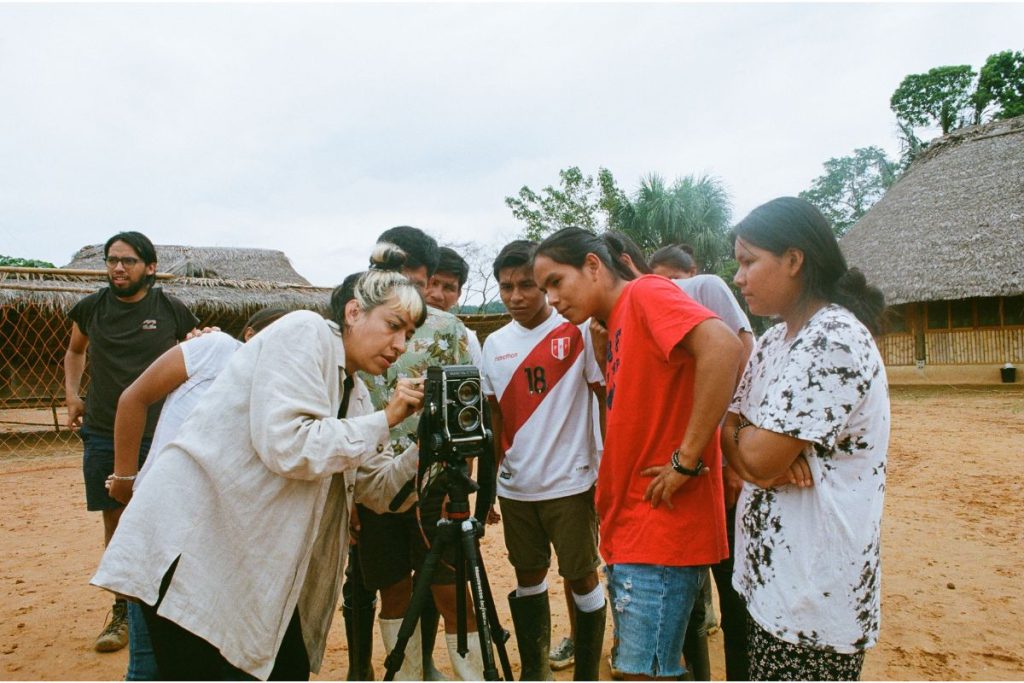Using film to Create More Cultural Representation Throughout the Amazon
Cinema, in its immediate, sensorial presentation of emotions, ideas, and the world around us, is one of the most influential storytelling mediums at our disposal. While containing all the great pleasures of entertainment, films can challenge our perception of the world around us and inform us about places and people we have never known. However, for cinema to be successful in this promising scope– it must expand the representation of marginalized voices in each step of the cinematic process, promoting active inclusion from directing, producing, acting, and last but not least, the actual spaces for screening films.
In recent decades, Indigenous peoples, initially either absent or subject to stereotypical portrayals in cinema, have become empowered through a series of initiatives in the Amazon region, such as Alianza Ceibo and Tawna Cine Desde Territorio supplying them with the tools and agency necessary to step into the spotlight and share their own stories.
Indigenous filmmakers and their films have now reached international stages and acclaim, allowing those a world away from the Amazon to engage in the viewing of a film and learn of the traditions and struggles of Indigenous peoples from an authentic perspective.
Yet a problem remains, how to bring the presentation of these Indigenous films to the very communities and cultures where these stories come from? Thousands of miles from the electric range of urban centers, Indigenous communities rarely get the opportunity to participate in cinema, and if they do, it is so often with the widespread inevitability of a Hollywood blockbuster.
Enter KANUA – the Amazon’s first-floating film festival – which has recently completed its revolutionary two-week journey on a solar-powered electric canoe to visit 8 Ecuadorian Indigenous communities and showcase a curated selection of 29 films from Indigenous territories.
Through the use of solar energy, both to power the voyage of the canoe and the projection of films in each community, the reach of cinema– and its many positive influences on culture, education, entertainment, and empowerment– may expand beyond traditional audiences and provide a decentralized landscape for underserved narratives to progress and inspire.
Indigenous filmmakers from across Peru, Brazil, Ecuador, Colombia, Mexico, Venezuela, and Chile have contributed films with essential themes that reflect the realities and cultures of various peoples. The result is a powerful audiovisual bridge of Indigenous unity and exchange across the Amazon region. This bridge strengthens Indigenous collective identity, while celebrating the individuality of each culture, and transforms isolated struggles of territorial defense into one stronger alliance for the conservation of the Amazon as a whole.
Along with the inclusive screenings, the festival hosted a series of participatory workshops within each community, fostering accessibility and education around cinema and solar technology.
Sani Montahuano, Indigenous filmmaker and General Producer of KANUA, details in the opening press conference– “Telling the stories and memories of our people, of our ancestors and our elders, is extremely important. Indigenous peoples have been exploited visually by outsiders for many, many years. Now is a time to empower ourselves with the same audiovisual tools that have traditionally been used against us. From here, we can start to create cinema from our territories, which is a form of defense for our land and spirits.”
The inception and creation of KANUA was a joint initiative by two important organizations, whose work aligns to support empowerment across Amazonian Indigenous communities within the arts and sustainability– effectively merging the power to narrate with the power to navigate!
→ Tawna Cine Desde Territorio is an Ecuadorian film organization focused on producing and supporting audiovisual works centered around Amazonian narratives– the fight, progress, and daily existence of those who call the Amazon home. Along with decolonizing audiovisual creation, Tawna promotes access to digital culture and education across Amazonian territories. By empowering Indigenous peoples to tell their own stories, Tawna believes this can be another powerful form of territorial defense and preservation.
→ Kara Solar is re-imagining the future of clean river transportation across the Amazon. Established in 2018, through a partnership with the Achuar Indigenous people of Ecuador, Kara Solar has thus far built 3 solar centers, and 5 solar-powered canoes, and emphasized the extensive training of Indigenous technicians– providing them with all of the necessary skills to manage and maintain a sustainable energy source within their communities. Kara Solar is dedicated to improving the transportation infrastructure of the Amazon. By proposing a model of technological independence free from the damaging and costly reliance on gasoline, the thousands of crisscrossing rivers across the region can be prioritized as alternatives for transportation against new roads being built and further destroying biodiverse landmass.
As KANUA showcased its final film on December 6th in the community of Wayusentsa, a brand new solar center was inaugurated within the community and the electric canoe that traveled across so many miles found a home to continue serving thousands of Indigenous peoples in their daily commutes.
The success of the festival on a pan-regional level is undeniable, and as #COP30 approaches in Belem, Brazil in 2025– KANUA will look to explore a new route along the Brazilian Amazon.
Stay tuned for further posts exploring the films KANUA celebrated and a look at the historical growth of solar energy within the Amazon!

